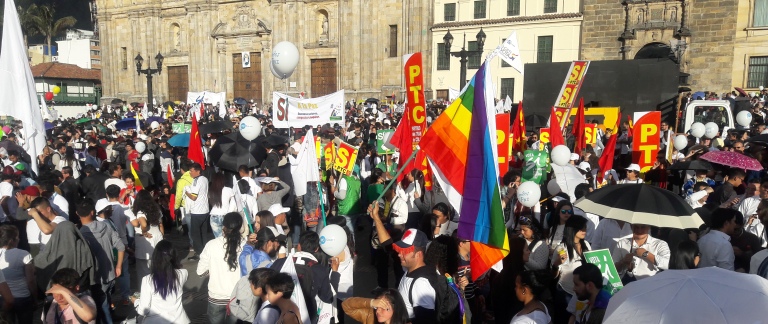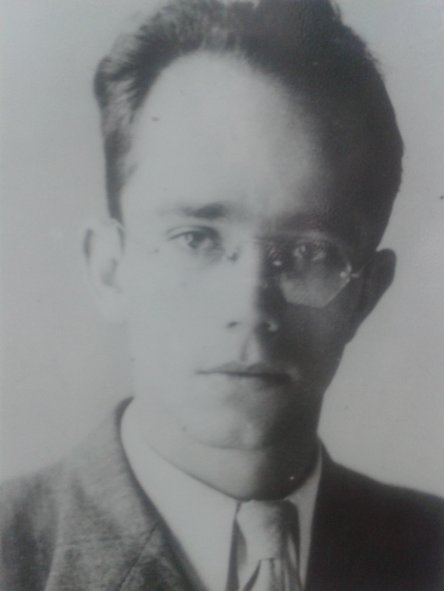
Jueves 6 de octubre de 2016, por ,
The following is a brief summary and translation of a statement put out by the José Alvear Restrepo Lawyers Collective, Colectivo de Abogados José Alvear Restrepo, with respect to the rejection of the plebiscite on the Peace Agreement between the Colombian Government and the FARC guerrilla group. For the full text in Spanish, please consult the following web link: http://www.colectivodeabogados.org/?Dialogo-amplio-nacional-para-salvar-el-Acuerdo-de-Paz
Paz |
Considering the following context:
62.5% of the electorate failed to vote in the plebiscite, which demonstrates the state of our democracy as well as questions the legitimacy of the very plebiscite.
There were 6,431,376 votes rejecting the Peace Agreement, which corresponds to 18.4% of the electorate.
The difference between those supporting and rejecting the Peace Agreement was only 53,894 votes.
Of the 32 departments in Colombia, 19 of the departments, in addition to the Capital District of Bogotá, and Colombians living abroad, voted in support of the Peace Agreement.
The Constitutional Court ruling on the the plebiscite determined that “the chosen mechanism must be genuinely democratic, meaning it must be preceded by instances of sufficient deliberation, which are also compatible with the freedom of the voter [...] it is essential that citizens make informed decisions, so as to adequately examine the content of political decision.”
The campaign against the Peace Agreement used deceptive information, misrepresenting the content of the agreement and generating a climate of fear with the clear purpose of manipulating the will of the voters, as actually occurred.
The following false arguments were spread, for example:
That the Final Agreement was threatened private property;
That the political participation for the FARC-EP was meant to establish a communist government (Castro-Chavism) and surrender the country to the guerrillas, which ignored the essence of the agreement which was for the guerrilla group to stop using weapons and instead participate in the democratic process;
That retired persons would see a reduction in their pensions;
That guerrilla members would receive a monthly stipend of 1,800,000 Colombian pesos (approximately 600 dollars per month);
That a “gender ideology” would be imposed because measures were contemplated to recognize the rights of women and LGBTI population.
The campaign against the Peace Agreement was motivated by the desire to hinder democratic advances and the rights of victims in order to favor current impunity, prevent access to land for poor peasants and the return of the displaced population to their land, and prevent the establishment of the Truth Commission and the Specialized Court of Justice for Peace.
Certain sectors of society are attempting to get the government and one political party (the Democratic Center, which opposed the plebiscite) to reach an agreement, even though the two former groups do not represent the majority of the Colombia. The future of peace in Colombia cannot be left in the hands of a few members of Colombia’s political elite.
Therefore, we propose a broad coalition for national dialogue, which —in addition to the previously mentioned political sectors— includes representatives from the regions that voted in favor of the agreements, ethnic communities, peasants, victims, social organizations, and human rights organizations, so that consensus can be reached to effectively finalize this peace process in the short term.
Taking into account that the government and the Farc-EP agreed to abide by the aforementioned Constitutional Court ruling, it was determined that the President is the only authority bound by the results of the plebiscite, not the other branches of government.
Since the plebiscite was rejected by the electorate, the President has lost his power to initiate legislation, however the Congress retains its full authority to adopt the signed agreement.
This means that the Congress could set a reasonable time for the government, the Farc-EP, the Democratic Center, and other political and social forces belonging to the Broad Coalition for National Dialogue, to reach agreements to consensually discuss and approve proposals to be adopted by the legislature.
If consensus cannot achieved, the Congress should process the Peace Agreement through a "Special Legislative Procedure for Peace" (Legislative Act 01 of July 7, 2016).
We also recognize the invaluable solidarity of the international community in the search for a negotiated solution to the armed conflict in Colombia and we call for that support to continue to assist a comprehensive national dialogue and to safeguard the peace agreement.
We call on social organizations, political movements, voters who supported the plebiscite, and other sectors of Colombian society to unite in social mobilization, demanding respect for the agreements, which have already been signed.
Afiliado a la Federación Internacional de Derechos Humanos
y la Organización Mundial contra la Tortura
Estatus Consultivo en la OEA

Nace en Medellín el 1 de julio de 1913 en el seno de una familia de profundas convicciones religiosas y bajo los parámetros de la ideología del partido conservador. Realiza sus estudios en la Facultad de Derecho de la Universidad de Antioquia, donde se gradúa de Abogado con una brillante tesis titulada: "Conflictos del trabajo: la huelga"
Ed. Avianca: Calle 16 No. 6-66 Piso 25 - Bogotá DC - Horario de Atención: Martes a Viernes, 2 a 5 pm - PBX: (571) 7421313 - FAX: (571) 2824270 - Apartado Aéreo: 33035




